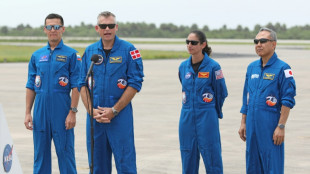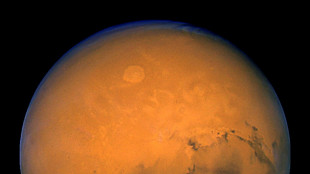
-
 Conservatives win German vote as far-right makes record gains
Conservatives win German vote as far-right makes record gains
-
'Captain America' slips but clings to N. America box office lead

-
 Tens of thousands vow support for Lebanon's Hezbollah at slain leader's funeral
Tens of thousands vow support for Lebanon's Hezbollah at slain leader's funeral
-
Tens of thousands pour in for Beirut funeral of slain Hezbollah leader

-
 Germans vote under shadow of far-right surge, Trump
Germans vote under shadow of far-right surge, Trump
-
Hong Kong and Singapore lead Asia's drive to cash in on crypto boom

-
 Well-off Hong Kong daunted by record deficits
Well-off Hong Kong daunted by record deficits
-
Trump tariffs shake up China's factory heartland

-
 Top issues in Germany's election campaign
Top issues in Germany's election campaign
-
Friedrich Merz: conservative on verge of German chancellery

-
 Germans go to vote under shadow of far-right surge, Trump
Germans go to vote under shadow of far-right surge, Trump
-
Oscars favorite Baker says indie film 'struggling' as 'Anora' tops Spirit Awards

-
 'Worst is over' as Chile's 'stolen' babies reunite with mothers
'Worst is over' as Chile's 'stolen' babies reunite with mothers
-
France's agriculture show, an outlet for angry farmers

-
 China's EV maker XPeng eyes doubling global presence by year's end
China's EV maker XPeng eyes doubling global presence by year's end
-
Germany on eve of elections under shadow of US-European rift

-
 France still seeking to block EU-Mercosur trade deal: Macron
France still seeking to block EU-Mercosur trade deal: Macron
-
Ukraine's earth riches are rare and difficult to reach

-
 On $15 a month, Venezuela's teachers live hand to mouth
On $15 a month, Venezuela's teachers live hand to mouth
-
'See you in court': Trump, governor spar over trans rights

-
 US stocks tumble on fears of slowdown
US stocks tumble on fears of slowdown
-
Cuba opens solar park hoping to stave off blackouts

-
 German flying taxi start-up's rescue deal collapses
German flying taxi start-up's rescue deal collapses
-
Stock markets diverge, oil prices slide

-
 'Queen of Pop' Madonna lambasts 'King' Trump
'Queen of Pop' Madonna lambasts 'King' Trump
-
Apple says halting data protection tool for UK users

-
 Female chefs condemn sexism in British kitchens
Female chefs condemn sexism in British kitchens
-
US, China economic leaders raise 'serious concerns' in first call

-
 Russia sells famed imperial prison at auction
Russia sells famed imperial prison at auction
-
Stock markets rise as Alibaba fuels Hong Kong tech rally

-
 France full-back Jaminet returns to rugby after racist video ban
France full-back Jaminet returns to rugby after racist video ban
-
Chinese AI companies celebrate DeepSeek, shrug off global curbs

-
 Asian markets advance as Alibaba fuels Hong Kong tech rally
Asian markets advance as Alibaba fuels Hong Kong tech rally
-
Nissan shares jump 11% on reported plan to seek Tesla investment

-
 Trump aid cut imperils water scheme in scorching Pakistan city
Trump aid cut imperils water scheme in scorching Pakistan city
-
Just 17% of Japan citizens hold passport, data shows

-
 Most Asian markets rise as traders pick over week of headlines
Most Asian markets rise as traders pick over week of headlines
-
Japan's core inflation rate hits 19-month high

-
 How a 'forgotten' Minnesota monastery inspired 'The Brutalist'
How a 'forgotten' Minnesota monastery inspired 'The Brutalist'
-
Japan's core inflation rate hits 3.2% in January

-
 Stocks mostly fall on tepid Walmart outlook, geopolitical worries
Stocks mostly fall on tepid Walmart outlook, geopolitical worries
-
Musk in X spat with Danish astronaut over 'abandoned' ISS crew

-
 Bond franchise shake-up moves spy into Amazon stable
Bond franchise shake-up moves spy into Amazon stable
-
New York seeks hundreds of millions of dollars in 'vaping epidemic' case

-
 Moon or Mars? NASA's future at a crossroads under Trump
Moon or Mars? NASA's future at a crossroads under Trump
-
Spotify adds more AI-generated audiobooks

-
 Stocks in the red as investors worry about growth and inflation
Stocks in the red as investors worry about growth and inflation
-
Bond franchise shifts to Amazon as Broccoli family steps back

-
 Unfair? Figures belie Trump's claims on EU trade balance
Unfair? Figures belie Trump's claims on EU trade balance
-
Stock markets mostly lower on Fed concerns over Trump policies


World must work together to tackle plastic ocean threat: WWF
Plastic has infiltrated all parts of the ocean and is now found "in the smallest plankton up to the largest whale" wildlife group WWF said on Tuesday, calling for urgent efforts to create an international treaty on plastics.
Tiny fragments of plastic have reached even the most remote and seemingly-pristine regions of the planet: it peppers Arctic sea ice and has been found inside fish in the deepest recesses of the ocean, the Mariana Trench.
There is no international agreement in place to address the problem, although delegates meeting in Nairobi for a United Nations environment meeting this month are expected to launch talks on a worldwide plastics treaty.
WWF sought to bolster the case for action in its latest report, which synthesises more than 2,000 separate scientific studies on the impacts of plastic pollution on the oceans, biodiversity and marine ecosystems.
The report acknowledged that there is currently insufficient evidence to estimate the potential repercussions on humans.
But it found that the fossil-fuel derived substance "has reached every part of the ocean, from the sea surface to the deep ocean floor, from the poles to coastlines of the most remote islands and is detectable in the smallest plankton up to the largest whale".
- 'Saturation point' -
According to some estimates, between 19 and 23 million tons of plastic waste is washed into the world's waterways every year, the WWF report said.
This is largely from single-use plastics, which still constitute more than 60 percent of marine pollution, although more and more countries are acting to ban their use.
"In many places (we are) reaching some kind of saturation point for marine ecosystems, where we're approaching levels that pose a significant threat," said Eirik Lindebjerg, Global Plastics Policy Manager at WWF.
In some places there is a risk of "ecosystem collapse", he said.
Many people have seen images of seabirds choking on plastic straws or turtles wrapped in discarded fishing nets, but he said the danger is across the entire marine food web.
It "will affect not only the whale and the seal and the turtle, but huge fish stocks and the animals that depend on those", he added.
In one 2021 study, 386 fish species were found to have ingested plastic, out of 555 tested.
Separate research, looking at the major commercially fished species, found up to 30 percent of cod in a sample caught in the North Sea had microplastics in their stomach.
Once in the water, the plastic begins to degrade, becoming smaller and smaller until it is a "nanoplastic", invisible to the naked eye.
So even if all plastic pollution stopped completely, the volume of microplastics in the oceans could still double by 2050.
But plastic production continues to rise, potentially doubling by 2040, according to projections cited by WWF, with ocean plastic pollution expected to triple during the same period.
- Enduring risk -
Lindebjerg compares the situation to the climate crisis -- and the concept of a "carbon budget", that caps the maximum amount of CO2 that can be released into the atmosphere before a global warming cap is exceeded.
"There is actually a limit to how much plastic pollution our marine ecosystems can absorb," he said.
Those limits have already been reached for microplastics in several parts of the world, according to WWF, particularly in the Mediterranean, the Yellow and East China Seas (between China, Taiwan and the Korean Peninsula) and in the Arctic sea ice.
"We need to treat it as a fixed system that doesn't absorb plastic, and that's why we need to go towards zero emissions, zero pollution as fast as possible," said Lindebjerg.
WWF is calling for talks aimed at drawing up an international agreement on plastics at the UN environment meeting, from February 28 to March 2 in Nairobi.
It wants any treaty to lead to global standards of production and real "recyclability".
Trying to clean up the oceans is "extremely difficult and extremely expensive", Lindebjerg said, adding that it was better on all metrics not to pollute in the first place.
A.Leibowitz--CPN
